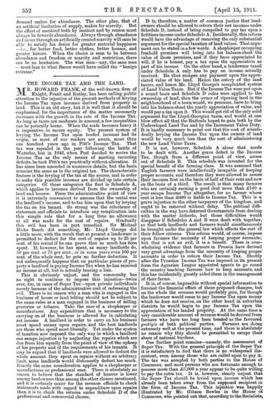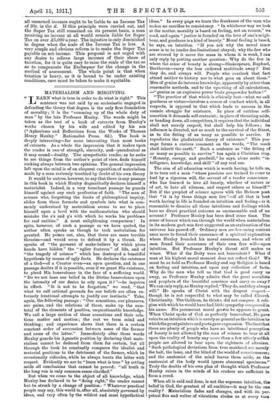THE INCOME TAX AND THE LAND. J R. HOWARD FRANK, of
the well-known firm of Knight, Frank and Rutley, has been calling public attention to the injustice of the present methods of levying the Income Tax upon incomes derived from property in land. This is an old story, but it is well that it should be emphasised, for the importance of the matter necessarily increases with the growth in the rate of the Income Tax. As long as taxes are moderate in amount, a few inequalities can be patiently borne. When the scale becomes heavy it is imperative to secure equity. The present system of levying the Income Tax upon landed incomes had its origin, as most of our readers are aware, more than one hundred years ago in Pitt's Income Tax. That tax was repealed in the year following the battle of Waterloo, but in 1842, when Peel decided to revive the Income Tax as the only means of meeting recurring deficits, he took Pitt's tax practically without alteration. It has since been amended in numerous details, but the basis remains the same as in the original tax. The characteristic feature is the levying of the tax at the source, and in order to make this possible incomes are divided up into certain categories. Of these categories the first is Schedule A, which applies to incomes derived from the ownership of land and houses. From the administrative point of view it is extremely convenient to assume that the rental was the landlord's income, and to tax him upon that by levying the tax on his tenant. So strong was the reluctance of statesmen and officials to introduce any complication into this simple rule that for a long time no allowance at all was made for the cost of repairs. Gradually this evil has been in part remedied. Sir Michael Hicks Beach did something, Mr. Lloyd George did a little more, with the result that at present a landowner is permitted to deduct for the cost of repairs up to 25 per cent. of his rental if he can prove that so much has been spent. If, however, he has spent, as many landlords do, 50 per cent. or 75 per cent., or in some years even 100 per cent. of the whole rent, he gets no further deduction. It not unfrequently happens that on particular pieces of pro- perty a landlord is paying Income Tax when he has received no income at all, but is actually bearing a loss.
This is obviously unjust, and the community has no right to continue to impose this injustice—twice over, too, in cases of Super Tax—upon private individuals merely because of the administrative cost of redressing the evil. There is no reason why a man who is engaged in the business of house or land letting should not be subject to the same rules as a man engaged in the business of selling groceries or tobacco. Take the case of a shopkeeper or manufacturer. Any expenditure that is necessary to the carrying on of the business is allowed for in calculating net income. A landlord in order to carry on his business must spend money upon repairs, and the best landlords are those who spend most liberally. Yet under the system of taxation now imposed the only way in which a landlord can escape injustice is by neglecting the repairs which are due from him equally from the point of view of the upkeep of his property and of the requirements of his tenants. It may be argued that if landlords were allowed to deduct the whole amount they spent on repairs without an arbitrary limit, some landlords would dishonestly deduct too much. Exactly the same consideration applies to a shopkeeper or manufacturer or professional man. There is absolutely no reason to believe that the standard of honour is lower among landowners than among the other classes mentioned, and it is certainly easier for the revenue officials to check statements made with regard to expenditure upon repairs than it is to check the returns under Schedule D of the professional and commercial classes. It is, therefore, a matter of common justice that land- owners should be allowed to return their net incomes under Schedule D, instead of being compelled to pay tax upon a fictitious income under Schedule A. Incidentally, this reform would have the advantage of removing the only substantial argument for the special taxation of land values. That argu- ment can be stated in a few words. A shopkeeper occupying freehold premises will bring into his balance-sheet the value of those premises, and if they have appreciated he will, if he is honest, pay a tax upon the appreciation as part of his income. On the other hand, a landowner taxed under Schedule A only has to pay on income actually received. He thus escapes any payment upon the appre- ciated value of his land. Hence the outcry of the land taxers, and hence Mr. Lloyd George's complicated system of Land Value Taxes. But if the Income Tax were put upon a sound basis and Schedule D rules were applied to the ownership of land, then the owner of ripening land in the neighbourhood of a town would, we presume, have to bring into his balance-sheet the yearly appreciation of value, and would pay a tax upon it. This would get rid of the only solid argument for the Lloyd-Georgian taxes, and would at one blow effect all that the Radicals hoped to gain both by the Undeveloped Land Tax and by the Increment Value Duty. It is hardly necessary to point out that the cost of scienti- fically levying the Income Tax upon the owners of land would be very much less than the cost of administering the new Land Value Taxes.
It is not, however, Schedule A alone that needs to be dealt with. Another grave defect in the Income Tax, though from a different point of view, arises out of Schedule B. This schedule was invented for the special benefit of the farming class. It was assumed that English farmers were intellectually incapable of keeping proper accounts, and therefore they were allowed to assess their incomes first on the basis of half of their rent and now on the basis of a third. The result is that many farmers who are certainly earning a good deal more than £160 a year escape Income Tax altogether, for no farmer whose rent is less than .2480 is liable to Income Tax. This is a grave injustice to the other taxpayers of the kingdom, and ought to be removed without delay. The political diffi- culties in the way have deterred Governments from dealing with the matter hitherto, but those difficulties would disappear if Schedules A and B were dealt with together, so that both landlords and farmers would simultaneously be brought under the general law which affects the rest of their fellow citizens. This reform would, of course, impose upon farmers the necessity of keeping proper accounts; but that is not an evil, it is a, benefit. There is over- whelming evidence that farmers in Prussia have derived very great advantage from the necessity of keeping proper accounts in order to return their Income Tax. Shortly after the Prussian Income Tax was imposed in its present form the Agrarian League appointed agents to go round the country teaching farmers how to keep accounts, and this has incidentally greatly aided them in the management of their farms.
It is, of course, impossible without special information to forecast the financial effect of these proposed changes, but on the whole the revenue would probably gain, for though the landowner would cease to pay Income Tax upon money which he does not receive, on the other hand in suburban districts he would begin to pay Income Tax upon the appreciation of his landed property. At the same time a very considerable amount of revenue would be derived from farmers who have too long been treated as the favoured protégés of both political parties. Farmers are doing extremely well at the present time, and there is absolutely no reason why they should be permitted to escape their share of national burdens.
One further point remains—namely, the assessment of Super Tax. With the general principle of the Super Tax it is satisfactory to find that there is no widespread dis- content, even among those who are called upon to pay it. The tax was accepted by both parties in the House of Commons, and most persons who are fortunate enough to possess more than £5,000 a year appear to be quite willing to pay the extra tax. It is, however, clearly unjust that the Super Tax should be levied upon income which has already been taken away from the supposed recipient in the form of Income Tax. This injustice was happily illustrated by Mr. Gibson Bowles in the House of Commons, who pointed out that, according to the Socialists,
all unearned incomes ought to be liable to an Income Tax
of 20s. in the If this principle were carried out, and the Super Tax still remained on its present basis, a man receiving no income at all, would remain liable for Super Tax on over £5,000 a year. The injustice is only diminished in degree when the scale of the Income Tax is less. A very simple and obvious reform is to make the Super Tax payable on net income. This proposal is not urged with any desire to relieve large incomes of their share of taxation, for it is quite easy to raise the scale of the tax so as to compensate the Exchequer for the change in the method of assessment. The whole point is that when taxation is heavy, as it is bound to be under existing conditions, care must be taken to make it equitable.





































 Previous page
Previous page